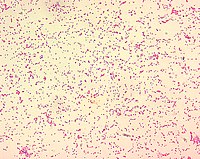
Photo from wikipedia
Bovine respiratory syncytial virus (BRSV) and bovine coronavirus (BCoV) affect dairy herds worldwide. In this study, effects on herd health, morbidity, and antimicrobial resistance (AMR) were assessed. Herds were considered… Click to show full abstract
Bovine respiratory syncytial virus (BRSV) and bovine coronavirus (BCoV) affect dairy herds worldwide. In this study, effects on herd health, morbidity, and antimicrobial resistance (AMR) were assessed. Herds were considered free of infection (FREE), recently infected (RI) or past steadily infected (PSI) based on antibody testing of milk from primiparous cows. Data from farm records, national databases, and AMR of fecal Escherichia coli from calves were used as outcome variables. Compared to BRSV FREE herds: BRSV PSI herds had significantly higher odds of cough in young stock, a higher proportion of quinolone-resistant E. coli (QREC), but a lower proportion of cows with fever. BRSV RI herds had significantly higher odds of diarrhea in calves and young stock, a higher proportion of QREC and higher odds of multidrug-resistant E. coli. Compared to BCoV FREE herds: BCoV PSI herds had significantly higher odds of cough in all ages, and of diarrhea in young stock and cows, and a higher proportion of cows with fever. BCoV RI herds had significantly higher odds of diarrhea in young stock and cows and of cough in all ages. The results support previous research that freedom from BRSV and BCoV is beneficial for animal welfare and farm economy and possibly also mitigates AMR.
Journal Title: Antibiotics
Year Published: 2021
Link to full text (if available)
Share on Social Media: Sign Up to like & get
recommendations!